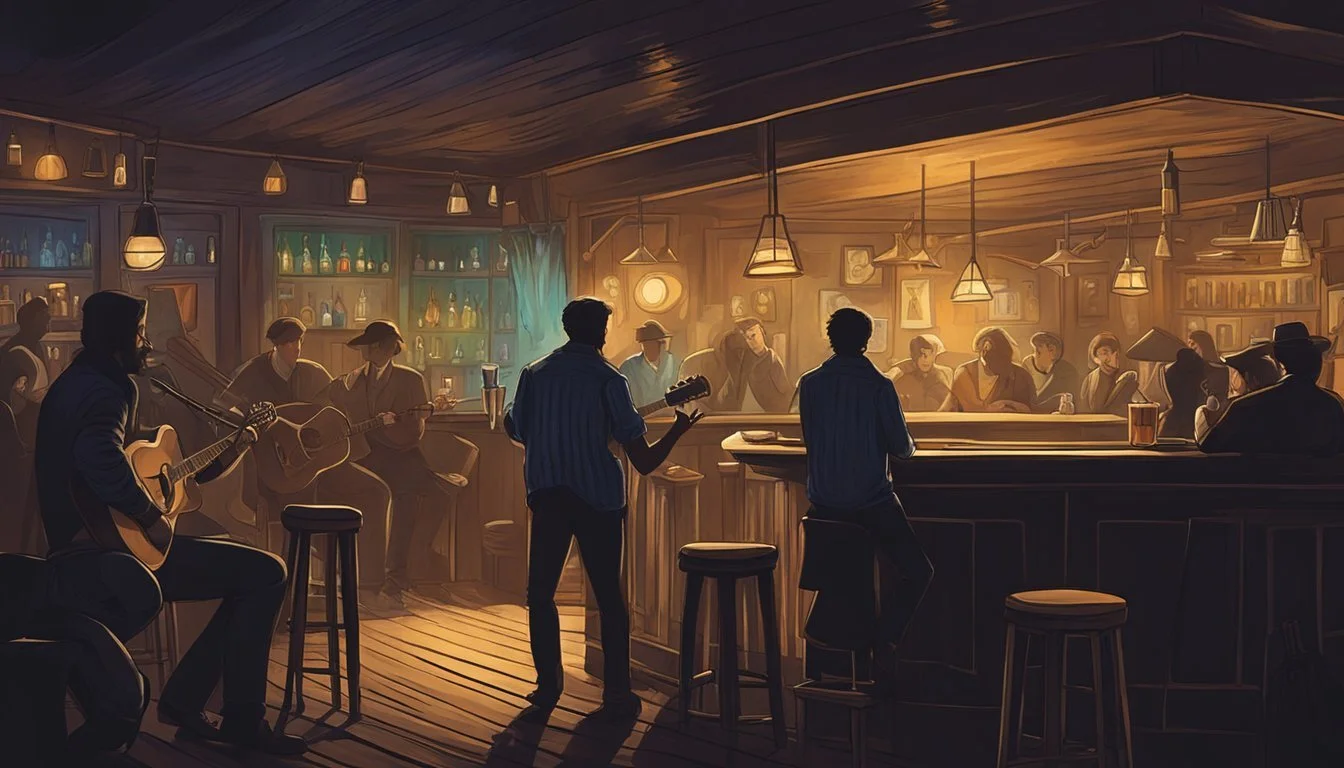How "Willie Nelson & Family" Captures Willie's Humble Beginnings
A Journey from Poverty to Country Music Icon
Willie Nelson's journey from small-town Texas to music legend is beautifully chronicled in the docuseries "Willie Nelson & Family." The five-part series, directed by Thom Zimny and Oren Moverman, premiered at the Sundance Film Festival, offering an intimate look at the country icon's life and career.
The series traces Nelson's roots in Abbott, Texas, showcasing how his humble beginnings shaped the artist and activist he would become. It delves into his early struggles as a songwriter in Nashville, his rise to fame, and his enduring impact on country music. The documentary doesn't shy away from Nelson's personal challenges, including his financial troubles and battles with substance abuse.
"Willie Nelson & Family" also highlights Nelson's activism and philanthropic efforts, particularly his work with Farm Aid. Through interviews with family members, fellow musicians, and Willie himself, the series paints a comprehensive portrait of a man who has lived life on his own terms while leaving an indelible mark on American culture.
Early Life of Willie Nelson
Willie Nelson's journey from humble beginnings to music legend is a quintessential American story. His early experiences in Texas and exposure to diverse musical influences shaped the artist he would become.
The Texan Roots
Willie Hugh Nelson was born on April 29, 1933, in Abbott, Texas. Raised by his grandparents during the Great Depression, he experienced rural life firsthand. Nelson's childhood was marked by cotton picking and helping on the family farm.
At age six, Willie received his first guitar from his grandfather. This gift sparked his lifelong passion for music. The young Nelson began writing songs and performing at local gatherings.
Abbott's small-town atmosphere influenced Willie's songwriting. He drew inspiration from the struggles and joys of everyday people around him.
Musical Influences
Willie's early musical tastes were eclectic. He absorbed the sounds of country, jazz, and blues from radio broadcasts. Artists like Bob Wills, Hank Williams, and Django Reinhardt left lasting impressions.
Gospel music played a significant role in shaping Nelson's style. He sang in the church choir and attended revival meetings. These experiences contributed to his distinctive vocal phrasing.
Willie also found inspiration in Mexican music, thanks to migrant workers who passed through Abbott. This diverse musical palette would later define his unique sound.
The Rise of a Singer-Songwriter
As a teenager, Willie played in local bands and on radio shows. He honed his skills as a performer and songwriter during this time. After high school, Nelson briefly joined the Air Force but was discharged due to back problems.
In the 1950s, Willie moved to Vancouver, Washington, where he worked as a DJ and continued to write songs. His talent for crafting lyrics caught the attention of music industry professionals.
Nelson's breakthrough came when he sold his song "Family Bible" for $50. The song's success encouraged him to move to Nashville in 1960 to pursue a career as a songwriter.
The Emergence of Willie Nelson & Family
Willie Nelson's journey from struggling songwriter to country music icon was marked by persistence and innovation. His unique style and collaborative spirit laid the foundation for a musical legacy that would reshape the genre.
Formation and Early Years
Willie Nelson's career began in the 1950s as a DJ and songwriter in Texas. He moved to Nashville in 1960, where he penned hits for other artists like Patsy Cline's "Crazy." Despite his songwriting success, Nelson struggled to find his footing as a performer.
In 1970, his house in Tennessee burned down. This pivotal moment led Nelson to return to Texas, where he found a more receptive audience for his unconventional sound. He grew out his hair, embraced his Texas roots, and began assembling the band that would become known as "Family."
The group included his sister Bobbie on piano, drummer Paul English, and harmonica player Mickey Raphael. This core lineup formed the backbone of Nelson's distinctive sound.
Development of the 'Outlaw Country' Sound
Willie Nelson, along with artists like Waylon Jennings, spearheaded the Outlaw Country movement in the mid-1970s. This subgenre rejected the polished Nashville sound in favor of a rawer, more authentic approach.
Nelson's breakthrough came with the concept album "Red Headed Stranger" in 1975. The stripped-down production and narrative storytelling marked a departure from mainstream country music. The album's success cemented Nelson's status as a leading figure in Outlaw Country.
His distinctive guitar playing on his famous guitar "Trigger," combined with his nasal vocal twang, became hallmarks of the Willie Nelson sound. The band's live performances gained a reputation for their loose, jam-band feel, further distinguishing them from traditional country acts.
Professional Career Highlights
Willie Nelson's career spans over seven decades, marked by groundbreaking achievements and artistic evolution. His distinctive voice and songwriting prowess have left an indelible mark on country music and beyond.
Critical Acclaim and Commercial Success
Willie Nelson's breakthrough came in the 1970s with albums like "Red Headed Stranger" and "Stardust." These releases showcased his unique vocal style and innovative approach to country music. "Red Headed Stranger" became a critical and commercial success, solidifying Nelson's status as a leading figure in the outlaw country movement.
His 1978 album "Stardust" further demonstrated his versatility, featuring interpretations of pop standards. It remained on the country charts for a decade, highlighting Nelson's broad appeal.
Throughout his career, Nelson has earned numerous Grammy Awards and Country Music Association honors. His songs "On the Road Again" and "Always on My Mind" became enduring hits, cementing his place in music history.
Collaborations and Reinventions
Willie Nelson's collaborative spirit has led to memorable duets and projects. He joined forces with Waylon Jennings, Johnny Cash, and Kris Kristofferson to form the supergroup The Highwaymen in the 1980s.
Nelson has also recorded with artists across genres, including Dolly Parton and jazz trumpeter Wynton Marsalis. These collaborations showcase his musical versatility and willingness to explore new territories.
In recent years, Nelson has continued to release new material and reinvent himself. His 2018 album "My Way" paid tribute to Frank Sinatra, demonstrating his enduring creativity and ability to connect with audiences across generations.
Cinematic Representation of Willie's Journey
The documentary "Willie Nelson & Family" offers a vivid portrayal of Willie Nelson's life and career through expert direction, compelling screenwriting, and a prestigious film festival debut. This multi-part series blends archival footage with contemporary interviews to create a rich cinematic memoir.
Thom Zimny's Direction
Thom Zimny brings Willie Nelson's story to life with a keen eye for visual storytelling. He skillfully weaves together historical clips and present-day footage, creating a non-linear narrative that spans seven decades. Zimny's direction captures the essence of Willie's perseverance and musical journey.
His approach highlights key moments in Nelson's career, from his humble beginnings in Abbott, Texas, to his rise as an American music icon. The series showcases Willie's evolution as an artist, activist, and cultural figure.
Oren Moverman's Screenwriting
Oren Moverman's screenplay provides a balanced and insightful look into Willie Nelson's life. It delves into various aspects of Willie's persona, including his music, philanthropy, and advocacy work.
The script explores Willie's challenges and triumphs, offering viewers a nuanced understanding of his character. Moverman's writing emphasizes Nelson's impact on American music and culture, touching on his roles as a singer-songwriter, actor, and activist.
Key themes in the screenplay include:
Willie's musical influences and innovations
His activism for farmers and marijuana legalization
Personal struggles and professional achievements
The Role of the Sundance Film Festival
The Sundance Film Festival played a crucial part in introducing "Willie Nelson & Family" to audiences. The documentary's debut at this prestigious event garnered critical acclaim and heightened anticipation for its wider release.
Sundance provided a platform for the series to showcase its artistic merit and cultural significance. The festival's recognition helped position the documentary as a noteworthy exploration of Willie Nelson's life and legacy.
Following its successful festival run, the series was adapted for streaming platforms, making it accessible to a broader audience. This transition from film festival to streaming service demonstrates the evolving landscape of documentary distribution and consumption.
Personal Life and Activism
Willie Nelson's life extends far beyond his musical achievements. His personal experiences, philanthropic efforts, and advocacy work have shaped his public persona and left a lasting impact on American culture.
Milestones and Personal Reflections
Willie Nelson has been married four times and has seven children. His current marriage to Annie D'Angelo began in 1991. Nelson's family life has been a source of inspiration for many of his songs.
Nelson's autobiography, "It's a Long Story: My Life," offers intimate insights into his personal journey. He reflects on his upbringing in Abbott, Texas, and the influence of his grandparents who raised him.
The singer has faced financial struggles, including a well-publicized battle with the IRS in the 1990s. This experience led to the release of his album "The IRS Tapes: Who'll Buy My Memories?" to help pay off his tax debt.
Engagement and Legacy in Philanthropy
Farm Aid, co-founded by Nelson in 1985, remains his most significant philanthropic endeavor. The organization has raised over $60 million to support family farmers and promote sustainable agriculture.
Nelson's commitment to rural communities extends beyond Farm Aid. He has supported various educational initiatives, including scholarships for students in his hometown.
The Willie Nelson Peace Research Institute, established in 2007, focuses on promoting peace and understanding. This organization reflects Nelson's lifelong commitment to social justice and harmony.
Marijuana Advocacy and the American Outlaw
Nelson's advocacy for marijuana legalization has been a defining aspect of his public image. He launched his own cannabis brand, Willie's Reserve, in 2015.
The singer has been arrested multiple times for marijuana possession, cementing his status as an "outlaw" figure in American culture. These experiences have fueled his activism for drug policy reform.
Nelson serves on the advisory board of the National Organization for the Reform of Marijuana Laws (NORML). His influence has helped bring the conversation about cannabis legalization into the mainstream.
Impact and Influence on Music and Culture
Willie Nelson's impact on music and culture extends far beyond his songwriting and performances. His unique style and persona have shaped the landscape of country music and American culture for decades.
Outlaw Country and Beyond
Willie Nelson played a pivotal role in the development of outlaw country. This subgenre emerged in the 1970s as a rebellion against the polished Nashville sound. Nelson's unconventional approach to music-making and his refusal to conform to industry standards helped define the outlaw movement.
His influence reaches beyond country music. Nelson's collaborations with artists from various genres have bridged musical divides. He has worked with jazz, rock, and pop musicians, expanding his reach and introducing new audiences to his distinctive style.
Nelson's songwriting has inspired countless artists. His ability to craft emotionally resonant lyrics and memorable melodies has set a high bar for songwriters across generations.
The Legacy of a Beloved Musician
Willie Nelson's legacy as a beloved musician is rooted in his authenticity and relatability. His down-to-earth persona and honest lyrics have endeared him to fans for decades.
Nelson's activism has amplified his cultural influence. He has been a vocal advocate for farmers, environmental causes, and marijuana legalization. His annual Farm Aid concert series has raised millions for family farmers since 1985.
His iconic status in American culture is evident in his numerous awards and honors. Nelson has received Grammys, Country Music Association Awards, and induction into multiple halls of fame. These accolades reflect his enduring impact on music and society.
Nelson's influence continues to resonate with new generations of musicians and fans. His timeless songs and artistic integrity ensure his place as a central figure in American musical history.
Modern Reception and Continued Relevance
Willie Nelson's music and legacy continue to resonate with audiences across generations. His enduring appeal has found new life in the digital age through streaming platforms and documentary series.
Perpetuation in Streaming Era
Willie Nelson's extensive catalog thrives on streaming services. Platforms like Spotify and Apple Music feature his classic hits and lesser-known gems, introducing younger listeners to his iconic sound. His songs consistently appear in curated playlists, maintaining relevance decades after their initial release.
Nelson's adaptability shines through collaborations with contemporary artists. These partnerships expose his music to new audiences and showcase his versatility. His timeless lyrics and distinctive voice translate well to the digital format, ensuring his place in modern music consumption.
Reception of the 'Willie Nelson & Family' Series
The "Willie Nelson & Family" docuseries on Paramount+ has garnered critical acclaim. The five-part series offers an intimate look at Nelson's life and career, blending archival footage with new interviews. It received a 2024 Emmy Award nomination for Outstanding Arts and Culture Documentary.
Viewers praise the series for its comprehensive portrayal of Nelson's journey. It covers his humble beginnings in Abbott, Texas, to his status as a music legend. The official trailer generated significant buzz, drawing in both long-time fans and curious newcomers.
Critics highlight the series' ability to capture Nelson's authenticity and impact on American culture. It features insights from fellow musicians like Dolly Parton and Kenny Chesney, adding depth to Nelson's story. The docuseries cements Willie Nelson's status as a pivotal figure in music history.
Extras and Anecdotes
Willie Nelson's life is filled with colorful stories both on and off stage. His performances and travels have become the stuff of legend, offering a glimpse into the extraordinary experiences of this iconic musician.
Stories from Iconic Performances
Willie Nelson's concerts are known for their unique atmosphere. At Farm Aid in 1995, he played to a crowd of over 50,000 people at Cardinal Stadium in Louisville. The event showcased his commitment to supporting American farmers.
His 90th birthday celebration at the Hollywood Bowl in 2023 was a star-studded affair. The concert brought together multiple generations of musicians to honor Willie's enduring influence on country music and beyond.
Willie's impromptu jam sessions often lead to memorable moments. He's been known to invite audience members on stage, creating spontaneous duets that delight fans.
Tales from the Road
Willie's tour bus, nicknamed "Honeysuckle Rose," is legendary in music circles. It's been the site of countless songwriting sessions and late-night conversations with fellow musicians.
His well-documented love for marijuana has led to some amusing incidents. In one famous story, Willie smoked a joint on the roof of the White House during Jimmy Carter's presidency.
Willie's generosity on the road is well-known. He often shares his famous "Willie's Reserve" cookies with crew members and fellow artists, fostering a sense of camaraderie among his touring family.
His encounters with law enforcement have become part of his lore. In 2006, Louisiana police found over a pound of marijuana on his tour bus, leading to a brief arrest that only added to his outlaw image.






